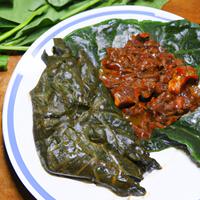
1 serving (100 grams) contains 35 calories, 2.3 grams of protein, 0.1 grams of fat, and 7.2 grams of carbohydrates.

Log this food in SnapCalorie

Nutrition Information
Calories |
83.3 | ||
|---|---|---|---|
% Daily Value* |
|||
| Total Fat | 0.2 g | 0% | |
| Saturated Fat | 0.0 g | 0% | |
| Polyunsaturated Fat | 0 g | ||
| Cholesterol | 0 mg | 0% | |
| Sodium | 47.6 mg | 2% | |
| Total Carbohydrates | 17.1 g | 6% | |
| Dietary Fiber | 3.6 g | 12% | |
| Sugars | 1.2 g | ||
| protein | 5.5 g | 11% | |
| Vitamin D | 0 mcg | 0% | |
| Calcium | 119.0 mg | 9% | |
| Iron | 2.9 mg | 16% | |
| Potassium | 714.3 mg | 15% | |
* Percent Daily Values are based on a 2,000 calorie diet. Your daily values may be higher or lower depending on your calorie needs.
Food Attributes
Source of Calories
About Yam leaves
Yam leaves are the heart-shaped foliage of the yam plant, often featured in Asian, African, and Caribbean cuisines. Nutritionally dense, these vibrant greens are rich in vitamins A, C, and B6, as well as essential minerals like calcium, iron, and potassium. High in dietary fiber, yam leaves support digestion and help in maintaining healthy cholesterol levels. Their antioxidants contribute to overall immune health and may reduce inflammation. Typically prepared sautéed, steamed, or included in soups and stews, yam leaves offer a slightly earthy, mildly bitter flavor that pairs well with spices and savory dishes. While generally low in calories and fat, consuming yam leaves raw may lead to slight irritation due to naturally occurring phytonutrients, so cooking is advised. Valued for their health benefits and versatility, yam leaves showcase the nutritional power of leafy greens alongside a distinct cultural heritage of traditional cuisines worldwide.



